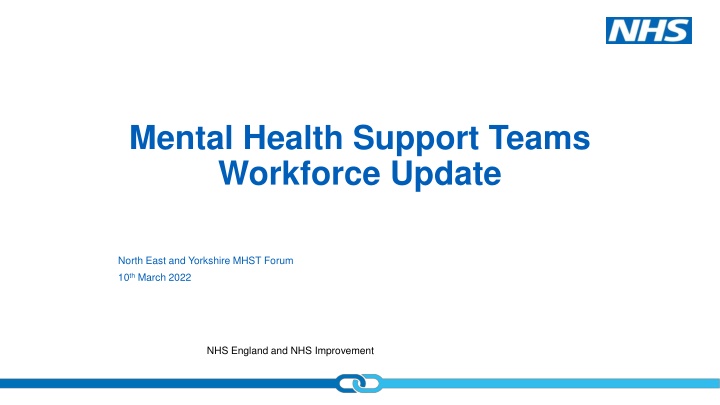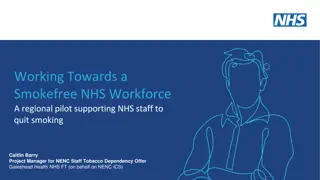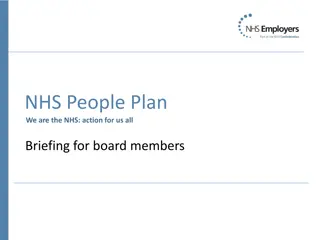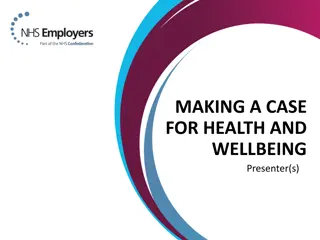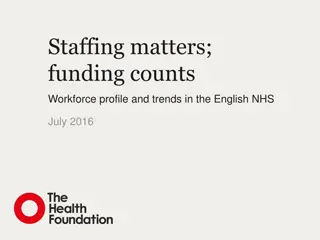Mental Health Support Teams Workforce Update in NHS
The NHS Long Term Plan outlines significant investments in eating disorder services, crisis care, digital therapies, and more for children and young people. It focuses on reducing waiting times, enhancing support for vulnerable populations, and expanding mental health services, including Mental Health Support Teams in schools.
Uploaded on Mar 06, 2025 | 0 Views
Download Presentation

Please find below an Image/Link to download the presentation.
The content on the website is provided AS IS for your information and personal use only. It may not be sold, licensed, or shared on other websites without obtaining consent from the author.If you encounter any issues during the download, it is possible that the publisher has removed the file from their server.
You are allowed to download the files provided on this website for personal or commercial use, subject to the condition that they are used lawfully. All files are the property of their respective owners.
The content on the website is provided AS IS for your information and personal use only. It may not be sold, licensed, or shared on other websites without obtaining consent from the author.
E N D
Presentation Transcript
Mental Health Support Teams Workforce Update North East and Yorkshire MHST Forum 10thMarch 2022 NHS England and NHS Improvement
The NHS Long Term Plan Eating Disorders Boost investment in children and young people s eating disorder services to continue seeing 95% of urgent cases within 1 week, and within 4 weeks for non-urgent cases. Four Week Waiting Times Test approaches that could deliver 4ww times for access to NHS support, ahead of introducing new national waiting time standards for all children and young people who need specialist MH services Crisis Services With a single point of access through NHS 111, all children and young people experiencing crisis will be able to access crisis care 24 hours a day, 7 days a week by 2023/24 Comprehensive offer for 0-25 year olds integrated across health, social care, education, and the voluntary sector to address health inequalities Digital Therapies Develop digitally enabled care pathways for children and young people in ways which increase inclusion Whole pathways, including inpatient beds Extension of New Models of Care/Provider Collaboratives continue to drive integrated pathways Access MHSTs form part of the commitment that by 2023/24, at least an additional 345,000 children and young people aged 0-25 will be able to access NHS- funded mental health services Mental Health Support Teams (MHSTs) MHSTs working in schools and colleges early intervention and whole school approach across 20-25% of country by 2023 Wider Commitments Additional investment in Youth Justice services Reduced waiting times and increased support for children and young people with learning disabilities and/or autism 6,000 highly vulnerable children with complex trauma will receive consultation, advice, assessment, treatment and transition into integrated services 2 | 2 |
Significant new funds for CYPMH in NHS Long Term Plan Baseline Year Year 4 Year 5 Year 1 Year 2 Year 3 [Settlement Ends] 2023/24 [FYFVMH Ends] 2020/21 Over 900m in additional funding has been made available during the Long Term Plan period 2021/22 2022/23 2018/19 2019/20 Children and Young People s Community and Crisis Central / Transformation CCG baselines 65 68 49 113 150 218 This is on top of existing mental health spend before 2018/19 Main funding streams are: 170 235 195 263 231 280 261 375 319 469 383 601 Total Central / Transformation CCG baselines Children and Young People s Eating Disorders 0 0 0 0 0 0 Growth in existing CYP Mental Health services (CAMHS) and CYP crisis 30 41 52 53 53 54 Total 30 41 52 53 53 54 Mental Health Support Teams (MHSTs) and 4 week waiting time pilots Children and Young People s (CYP) Mental Health Total Central / Transformation CCG baselines Continued expansion of CYPMH community eating disorder services to meet the access standard 24 76 115 136 185 249 0 0 0 0 0 0 Total Implementation of Mental Health Support Teams in schools and colleges 24 76 115 136 185 249 Central / Transformation CCG baselines 335 467 89 144 164 249 79m additional funding was made available in 2021/22 in response to the COVID-19 pandemic. 372 707 437 904 200 289 236 380 283 447 314 563 Total This funding forms part of the 500 million for mental health announced at the 2021 to 2022 spending review. It is being used to: Five-year profile for the FYFVMH and LTP ( m in cash terms) 500 1000 accelerate MHST 400 800 300 600 Complete 4 week wait pilots 200 400 100 200 improve capacity for CYPMH community and crisis and eating disorder 0 0 2018/19 2019/20 2020/21 2021/22 2022/23 2023/24 3 | 3 | Central / Transformation CCG baselines Total
MHSTs: What has been achieved to date? The Long-Term Plan Ambition: Mental Health Support Teams are being rolled-out to cover 20%-25% of the country by 2023 As a result of the Spending Review funding we have accelerated roll out of Mental Health Support Teams to around 399 teams, covering an estimated 3 million children and young people (35% of those in England) by 2023/24. MHSTs are rolled out in two 'waves' per year (training waves commence in September and January) 2018/19: 58 trailblazer MHSTs are now operational. Twelve of these sites are also piloting a four-week waiting time. 2019/20: 125 MHSTs are in their set-up phase and despite the pandemic should become fully operational during 2020/21 2020/21: further 104 MHSTs began recruitment and training in November 2020 2021/22: a further 112 teams have been commissioned By mid April 2022 we expect to be able to confirm we have reached our LTP ambition of 20-25% coverage a year earlier than planned as wave 3&4 sites complete their training update pupil coverage of 26% confirm Wave 7 & 8 sites which will take us to 503 teams ICS coverage information can be found on the NHS England page here 4 | 4 | Presentation title
The Multi-Year Approach to MHST Site Selection Having moved away from an annualised Expression of Interest Approach, regions have been supported to develop multi-year trajectories and plans for future MHST waves based on EMHP training places and funding in 2021/22 and beyond to achieve at least 20 - 25% coverage by 2023/24. This new approach includes; Providing a regional assessment of current MHST coverage, as part of a wider data pack, which will support local planning, reflect the needs of CYP and address gaps. Including a minimum coverage benchmark at regional and STP/ICS level of 20%-25% by 2023/24 in the expectation that funding would be baselined at that point. Refreshing existing guidance and site selection criteria. Maintaining national oversight of the programme and that it is being delivered in-line with the operating principles and programme priorities. Providing a national support offer throughout the site selection and mobilisation stages from NHSEI, DfE and HEE. Regions can develop a locally determined approach that should be; Multi-agency with clear collaboration between health and education and wider stakeholders Informed by achieving more equitable MHST coverage across STPs/ICSs based upon a review of the Regional Data Pack and identification of gaps in MHST coverage Meet the needs of children and young people, based upon a review of inequalities, such as those highlighted in the Regional Data Pack and local intelligence Developed through assessment of a site s competency and state of readiness to establish an MHST Advantages Regions will be able to plan coverage as one process - will simplify planning Increased confidence across NHSEI /HEE and training providers Regions enabled to design and deliver MHST expansion tailored to local need, based on local expertise and knowledge of what works Consideration of whole duration of the programme, rather than a year-by-year basis, will provide greater opportunity for equitable coverage aligned with CYP mental health needs and inequalities. More time for local areas to plan and prepare, including engagement with key partners locally. Wave of Delivery EMHP Training Cohorts Start Date September 2021* This multi-year planning process will incorporate site allocations for Waves 5 10: *Subject to impact of COVID-19 Wave 5 Wave 6 Wave 7 Wave 8 Wave 9 Wave 10 January 2022 September 2022 January 2023 September 2023 January 2024 5 | 5 |
The CYPMH workforce is growing According to latest NHS Benchmarking Report (October 2021) the total workforce expanded by 39% since 2018 NHS, independent and voluntary sectors grew substantially, whilst the LA workforce shrank CYPMH workforce sectoral composition: 78% are within the NHS 12% in the independent sector 7% in Voluntary Organisations 3% in Local Authorities NHS vacancies: have increased but remain at 9%. The majority are in nursing. NHS staff retention: Has fallen marginally from 83% to 80%. The full workforce audit report was published on 2nd November, and is on the HEE website 6 | 6 |
CYPMH Workforce Growth up to 21/22 Education Mental Health Practitioners (EMHPs) - over 1,600 trained or in-training since 2018-19 Children Wellbeing Practitioners (CWPs) over 1,700 trained or in-training since 2016-17 Recruit to Train/CYP IAPT therapists over 3,000 trained since 2011-12, and over 400 in 2021-22 Clinical Psychologists - 914 training in 21-22, an increase of over 25% on the previous year Child and Adolescent Psychotherapy 76 training in 21-22, plus 25% on previous year Family/Systemic Psychotherapy part funding for 27 new starters on AFT accredited MSc qualifying courses 7 | 7 |
Workforce developments in 22/23 Remotely delivered EMHP training will be piloted to increase access to existing and future training programmes. Trainings for Senior Wellbeing Practitioners (EMHPs and CWPs) Professional registration for EMHPs and CWPs CYPMH Primary Care/Additional Roles Reimbursement Scheme (ARRS) offer Annual NHS Benchmarking workforce audit Initiatives for enhancing CYPMH nursing education and training. Crisis team and 24/7 crisis line staff training Online Trauma Informed Care training package Initiatives for widening participation in the workforce Youth Intensive Psychological Practitioners (YIPPs) will begin training 8 | 8 |
Children's Wellbeing Practitioner and Education Mental Health Practitioner Retention and Career Progression Career progression pathways for CWPs and EMHPs through a Senior Wellbeing Practitioner role and training Apprenticeship routes into trainings likely later Training EMHPs and CWPs in supervision and extending clinical skill range so that trainee-supervisor skillsets are optimally-matched and pressure reduced on other senior clinical staff 2 years post qualification experience expected, but 1 year alongside existing qualifications/skills possible Aim is to offer training places from January 2023 Several areas including Barnet, Cornwall, and Coventry already have CWPs and EMHPs in B6 supervisory/Senior roles 9 | 9 |
EMHP and CWP Registration Registration with British Psychological Society (BPS) and British Association for Behavioural and Cognitive Psychotherapies (BABCP), identical processes. EMHP and CWP courses will be accredited by BPS and will involve grandparenting for those who ve already trained Registers expected to be open by spring/summer 2022 Mandatory Existing EMHPs and CWPs will have between 12-18 months to register Expected to reassure: employers through accountability of clinical practice prospective trainees of validity of career path Further details about maintaining registration will be shared by the professional bodies 10 | 10 |
Maintaining a full complement of EMHPs Each MHST is funded to maintain four EMHPs EMHPs drop out of training (attrition) as well as moving on after qualification (turnover) A limited central fund for attrition is distributed by HEE, and new sites are given priority access Where EMHP vacancies exist in sites after the set-up year, an underspend will have accumulated MHSTs are encouraged to utilise underspend to directly commission EMHP trainings from HEIs, where training capacity is available Remotely delivered training places may be accessible 11 | 11 |
Widening Participation in the workforce Driven by the need for choice and compatibility in clinical care, and the advantages of workforce diversity Ambition to empower local areas to recruit and appoint staff to reflect their local communities, and enable HEIs to utilise L6 (graduate) as well as L7 (post-graduate) training routes Supported by: Widening Participation sub-group of EMHP Curriculum Development Group MHST Equalities and Diversities Group Output so far include: Case study of representative recruitment in Calderdale Guidance on achieving workforce diversity in CWP Implementation Guide (forthcoming) and MHST Operating Manual V2 (forthcoming) Factoring into senior CWP/EMHP work ambitions for apprenticeship routes, ensuring HEIs continue to offer L6/7 routes into CWP PGDip Analysis of HEE data on training cohort diversity Analysis by HEIs of training cohort diversity Planned work includes: Survey of providers on representative recruitment and widening participation practices (April/spring 22) 12 | 12 |
